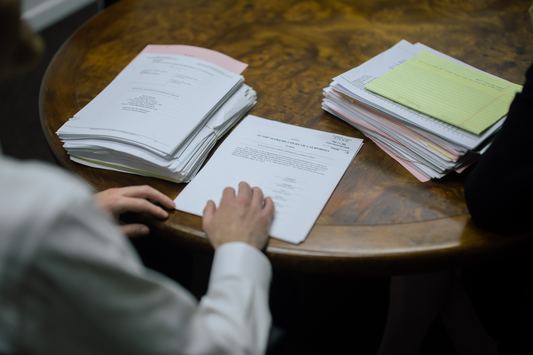Getting Post-Conviction Relief

The appeals process at times can be quite tricky and hard to navigate. Getting a skillful appeals attorney who understands relevant laws and deadlines is vital to a successful court petition. Experienced appellate attorneys are committed to providing dedicated assistance to clients using carefully crafted appellate strategies.
In analyzing each case, the process begins with…
1. Finding Mistakes and Errors At The Trial
If you did not receive a fair resolution in your original trial, you deserve the chance to have it reviewed. Experienced appellate attorneys will begin the process by obtaining trial transcripts on the meticulous hunt for any legal irregularities that may warrant an appeal.
2. Making Sure Appropriate Laws Apply to the Case
The next step is identifying existing laws that may help challenge the terms of your sentencing or even the conviction overall. This also applies to changes in legislation introduced post-conviction that may extend relief to defendants who originally might not have had the option.
3. Introducing New Evidence and Raising Additional Issues
In some cases, new evidence arises that calls a guilty verdict into question, and a request for the new information may be submitted.
4. Helping Clients Move Forward With Their Lives
The hardships for those who have been convicted do not stop at the prison walls. Upon release, they are faced with overwhelming discrimination in the job hunt and beyond. Experienced appellate attorneys hope to ease the transition back into society with relief from probation, sealing of records, and reinstatement of revoked rights.
- Getting Post-Conviction Relief
- Filing Post-Conviction Relief Documents in Criminal Case
- Types of Post-Conviction Relief
- The Importance of a Post-Conviction Relief Lawyer
Filing Post-Conviction Relief Documents in Criminal Case
There are many forms of post-conviction relief, each with its own timelines and procedures. Failure to miss a deadline may cost you the chance at justice and fair judgment. For guidance on such deadlines, be sure to contact an experienced appellate attorney and learn more about the urgency of your post-conviction relief efforts.
Experienced post-conviction attorneys have received many successful outcomes within California courts in their attempts to seek relief for clients. To learn more about how qualified counsel might be able to help your case, contact SPCRC's Recommended California Lawyers for a consultation regarding your case.
- Getting Post-Conviction Relief
- Filing Post-Conviction Relief Documents in Criminal Case
- Types of Post-Conviction Relief
- The Importance of a Post-Conviction Relief Lawyer
Types of Post-Conviction Relief

In dealing with post-conviction relief work, it is important that you have someone on your side who thoroughly understands California laws and their application in the appellate process. In each case one, or often more than one, type of post-conviction relief may be available. Some of the most common types of relief that experienced attorneys work with and have the most success with include:
Motion to Withdraw a Plea
Oftentimes defendants take plea deals with a prosecutor, wrongfully pleading guilty or no contest. This often is a result of the defendant's ineffective counsel that failed to explain the implications of such a decision. However, experienced appellate attorneys can help to withdraw a plea if it can be shown that the defendant did not understand what they were agreeing to. Once the plea has been withdrawn, the defendant has a second chance to either go to trial or negotiate a new, fair plea deal.
Motion for a New Trial
If it is proved a defendant’s original trial was not properly conducted, they may petition the court to request a new trial. Oftentimes a motion for a new trial may be granted in cases where there was clear prosecutorial misconduct or prejudice against the defendant that ultimately stripped them of their right to a fair trial. However, it is important to note that judges are often reluctant to grant this type of relief for fear of admitting fault in an unjust conviction.
Writ of Habeas Corpus
The writ of habeas corpus is oftentimes a last resort attempt at post-conviction relief and argues that the defendant has been illegally imprisoned. In building arguments for this motion, attorneys use anything from the trial that indicates a significant error was made or new evidence that seriously questions the guilty verdict. If the writ is granted, the defendant will be released from custody.
Re-sentencing
A motion for resentencing attempts to alter the terms of a defendant's original sentence. A change in sentencing is often used to request release from prison custody or probation.
Early Termination of Probation
While probation offers more freedom than incarceration, probation still poses a serious hindrance to reintegration after prison. The terms of a probation may limit an individual’s success in the job search or even travel out of state.
Commutation
If eligible, individuals may turn to a commutation for post-conviction relief. In granting a commutation of sentence, the California governor does not forgive the crime as they would in a pardon, but instead reduces a defendant's sentence.
Expungement
Once completing the terms of their probation, defendants may expunge their conviction from their record. Because expungement doesn't require a defendant's conviction to be revealed to employers, no longer will they be held back by their past imprisonment. Certain crimes however like murder, child endangerment, aggravated kidnapping, human trafficking, or any family offenses cannot be expunged under California law.
Restoration of Gun Rights
Oftentimes the loss of gun rights comes with a criminal conviction in California. However, if you were not convicted for a felony or domestic violence, experienced appellate attorneys can fight for their restoration. While rarer, gun rights may also be restored with a Governor's pardon.
Sealing of Juvenile Records
In California, once an individual reaches adulthood, access to juvenile records may be restricted under certain circumstances. Restricted records, while limited, are not destroyed or sealed. You may move to seal juvenile records to ensure no one has access to it, but it is important to note that those who:
- Have committed crimes such as murder, indecency with a child, or sexual assault,
- Have been registered as a sex offender,
- Has a case that has moved to adult court, or
- Has been deemed a habitual felony offender
are typically ineligible for the sealing of juvenile records.
- Getting Post-Conviction Relief
- Filing Post-Conviction Relief Documents in Criminal Case
- Types of Post-Conviction Relief
- The Importance of a Post-Conviction Relief Lawyer
The Importance of a Post-Conviction Relief Lawyer

The attorney you choose to guide you through the appellate process could make all the difference in the success of your post-conviction relief. Award-winning criminal appeals attorneys have taken many relief cases before California courts.
Top appellate legal teams know how to skillfully:
- Apply the law to each case: Appeals is a tricky area of law that requires a holistic understanding of the laws that put defendants behind bars and the statutes that help them get out. Experienced legal professionals are highly educated and know California state and federal law comprehensively.
- Analyzing court records: In one of the most important stages of the appellate process (analyzing records), it's vital that you have an experienced and knowledgeable team on your side. You need someone who will diligently and actively search through records to determine what mistakes were made in your case and what steps need to be taken to receive justice.
- Helping clients reach their goals: Top appellate attorneys are committed to protecting your rights and getting you to where you want to be. They want you to understand that you have many post-conviction relief options that can help you achieve great things professionally and personally.
To learn about post-conviction relief options in your case, contact SPCRC's Recommended California Lawyers for a consultation.